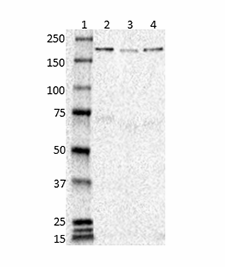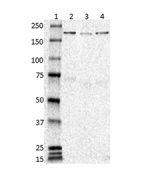- Clone
- 74-5H7 (See other available formats)
- Regulatory Status
- RUO
- Other Names
- Neural cell adhesion molecule L1, antigen identified by monoclonal antibody R1
- Previously
-
Covance Catalog# MMS-172R
- Isotype
- Mouse IgG1, κ
- Ave. Rating
- Submit a Review
- Product Citations
- publications

-

Western blot of Anti-CD171 (L1CAM) antibody (clone 74-5H7). Lane 1: Molecular weight marker; Lane 2: 20 µg of human brain total lysate; Lane 3: 20 µg of mouse brain membrane lysate; Lane 4: 20 µg of rat brain total lysate. The blot was incubated with 1:2000 dilution of the primary antibody overnight at 4°C, followed by incubation with HRP labeled goat anti-mouse IgG (Cat. No. 405306). Enhanced chemiluminescence was used as the detection system.
| Cat # | Size | Price | Quantity Check Availability | Save | ||
|---|---|---|---|---|---|---|
| 838101 | 500 µL | 347€ | ||||
L1CAM, also known as CD171, is a neuronal cell adhesion molecule involved in axon guidance and cell migration with a strong implication in treatment-resistant cancers. This cell adhesion molecule plays an important role in nervous system development, including neuronal migration, and differentiation. Mutations in the gene cause three X-linked neurological syndromes known by the acronym CRASH (corpus callosum hypoplasia, retardation, aphasia, spastic paraplegia and hydrocephalus). CD171 has been shown to function as a cell adhesion molecule mediating homotypic and heterotypic cell-cell interactions in neuronal myelination, neurite outgrowth and regeneration.
Product DetailsProduct Details
- Verified Reactivity
- Human, Mouse, Rat
- Antibody Type
- Monoclonal
- Host Species
- Mouse
- Immunogen
- This monoclonal antibody was raised against purified chick L1, and binds to the L1 cytoplasmic domain at about T1172 (adjacent to the YRSL sorting signal).
- Preparation
- Ascites
- Concentration
- The concentration is not quantified as this product is sold as undiluted crude mouse ascites fluid. The concentration might vary from lot-to-lot and an estimated concentration would be 1-3 mg/ml.
- Storage & Handling
- Store at -20°C. It is suggested that the total volume be divided into useable aliquots upon initial thaw.
- Application
-
WB - Quality tested
ICC, IP, IHC-P - Reported in the literature, not verified in house - Recommended Usage
-
Each lot of this antibody is quality control tested by Western blotting. For Western blotting, the suggested dilution for this reagent is 1:2000. It is recommended that the reagent be titrated for optimal performance for each application.
- Application Notes
-
Phosphorylation of either T1172 or Y1176 strongly inhibits binding of 74-5H7 to the L1 cytoplasmic domain.
- Application References
-
- Kamiguchi H, et al. 1998. J. Neurosci. 18(14):5311-21.
- Lemmon V, et al. 1989. Neuron. 2(6):1597-603.
- Yip PM, Siu CH. 2001. J. Neurochem. 76(5):1552-64.
- Schaefer AW, et. al. 2002. J. Cell Biol. 157:1223. (WB, IHC-P, IP)
- Beer S, et. al. 1999. J. Cell Sci. 112:2667. (IP)
- Itoh K, et. al. 2005. Mol. Cell Neurosci. 29:245. (WB, IP)
- Zheng XJ, et. al. 2005. Environ. Technol. 26:1073. (ICC)
- Chen SY, et. al. 2001. FASEB. J. 15:1649. (IHC-P) PubMed
- Itoh K, et. al. 2004. J. Cell Biol. 165:145. (WB)
- Cohen NR, et. al. 1998. Curr. Biol. 8:26. (WB)
- Product Citations
-
- RRID
-
AB_2565388 (BioLegend Cat. No. 838101)
Antigen Details
- Structure
- Expected MW: 200-220 kD
- Biology Area
- Cell Biology, Neuroscience, Synaptic Biology
- Molecular Family
- Adhesion Molecules
- Gene ID
- 3897 View all products for this Gene ID
- UniProt
- View information about CD171 on UniProt.org
Related Pages & Pathways
Pages
Related FAQs
Other Formats
View All CD171 (L1CAM) Reagents Request Custom Conjugation| Description | Clone | Applications |
|---|---|---|
| Anti-CD171 (L1CAM) | 74-5H7 | WB,ICC,IP,IHC-P |
Compare Data Across All Formats
This data display is provided for general comparisons between formats.
Your actual data may vary due to variations in samples, target cells, instruments and their settings, staining conditions, and other factors.
If you need assistance with selecting the best format contact our expert technical support team.
-
Anti-CD171 (L1CAM)

Western blot of Anti-CD171 (L1CAM) antibody (clone 74-5H7). ...
 Login / Register
Login / Register 












Follow Us